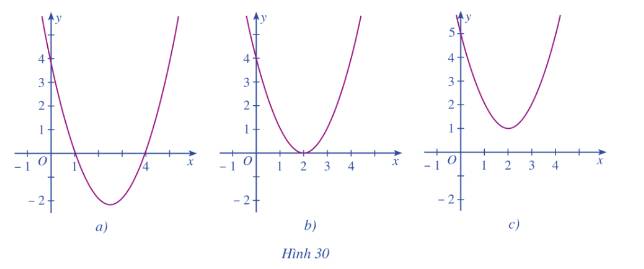cho bất phương trình \(f\left(x\right)\le g\left(x\right),x_0\) là một nghiệm của bất phương trình \(f\left(x\right)\le g\left(x\right)\) nếu:
A. f(x0)=g(x0) đúng
B. f(x0) >= g(xo) đúng
C. f(x0) <= g(x0) sai
D. f(x0) > g(x0) đúng
cho hàm số \(f\left(x\right)=x^3-3x^2+2\)
a, giải bất phương trình \(f'\left(x\right)\le0\)
b, giải phương trình \(f'=\left(x^2-3x+2\right)=0\)
c, đặt \(g\left(x\right)=f\left(1-2x\right)+x^2-x+2022\) giải bất phương trình\(g'\left(x\right)\ge0\)
\(a,f'\left(x\right)=3x^2-6x\\ f'\left(x\right)\le0\Leftrightarrow3x^2-6x\le0\\ \Leftrightarrow3x\left(x-2\right)\le0\Leftrightarrow0\le x\le2\)
Lời giải:
a. $f'(x)\leq 0$
$\Leftrightarrow 3x^2-6x\leq 0$
$\Leftrightarrow x(x-2)\leq 0$
$\Leftrightarrow 0\leq x\leq 2$
b.
$f'(x)=x^2-3x+2=0$
$\Leftrightarrow 3x^2-6x=x^2-3x+2=0$
$\Leftrightarrow 3x(x-2)=(x-1)(x-2)=0$
$\Leftrightarrow x-2=0$
$\Leftrightarrow x=2$
c.
$g(x)=f(1-2x)+x^2-x+2022$
$g'(x)=(1-2x)'f(1-2x)'_{1-2x}+2x-1$
$=-2[3(1-2x)^2-6(1-2x)]+2x-1$
$=-24x^2+2x+5$
$g'(x)\geq 0$
$\Leftrightarrow -24x^2+2x+5\geq 0$
$\Leftrightarrow (5-12x)(2x-1)\geq 0$
$\Leftrightarrow \frac{-5}{12}\leq x\leq \frac{1}{2}$
Cho hai hàm số \(f\left( x \right) = 2{{\rm{x}}^3} - {x^2} + 3\) và \(g\left( x \right) = {x^3} + \frac{{{x^2}}}{2} - 5\). Bất phương trình \(f'\left( x \right) > g'\left( x \right)\) có tập nghiệm là
A. \(\left( { - \infty ;0} \right] \cup \left[ {1; + \infty } \right)\).
B. \(\left( {0;1} \right)\).
C. \(\left[ {0;1} \right]\).
D. \(\left( { - \infty ;0} \right) \cup \left( {1; + \infty } \right)\).
Ta có:
\(f'\left(x\right)=6x^2-2x\\ g'\left(x\right)=3x^2+x\)
Theo đề bài, ta có:
\(f'\left(x\right)>g'\left(x\right)\\ \Leftrightarrow6x^2-2x>3x^2+x\\ \Leftrightarrow3x^2-3x>0\\ \Leftrightarrow3x\left(x-1\right)>0\\ \Leftrightarrow\left[{}\begin{matrix}x>1\\x< 0\end{matrix}\right.\)
Vậy tập nghiệm của bất phương trình là \(\left(-\infty;0\right)\cup\left(1;+\infty\right)\)
Chọn D.
Dựa vào đồ thị hàm số bậc hai \(y = f\left( x \right)\) trong mỗi Hình 30a, 30b, 30c, hãy viết tập nghiệm của mỗi bất phương trình sau: \(f\left( x \right) > 0;f\left( x \right) < 0;\)\(f\left( x \right) \ge 0;f\left( x \right) \le 0\).

Hình 30a:
\(f\left( x \right) > 0\) có tập nghiệm là \(S = \left( { - \infty ;1} \right) \cup \left( {4; + \infty } \right)\)
\(f\left( x \right) < 0\) có tập nghiệm là \(S = \left( {1;4} \right)\)
\(f\left( x \right) \ge 0\) có tập nghiệm là \(S = \left( { - \infty ;1} \right] \cup \left[ {4; + \infty } \right)\)
\(f\left( x \right) \le 0\) có tập nghiệm là \(S = \left[ {1;4} \right]\)
Hình 30b:
\(f\left( x \right) > 0\) có tập nghiệm là \(S = \mathbb{R}\backslash \left\{ 2 \right\}\)
\(f\left( x \right) < 0\) có tập nghiệm là \(S = \emptyset \)
\(f\left( x \right) \ge 0\) có tập nghiệm là \(S = \mathbb{R}\)
\(f\left( x \right) \le 0\) có tập nghiệm là \(S = \left\{ 2 \right\}\)
Hình 30c:
\(f\left( x \right) > 0\) có tập nghiệm là \(S = \mathbb{R}\)
\(f\left( x \right) < 0\) có tập nghiệm là \(S = \emptyset \)
\(f\left( x \right) \ge 0\) có tập nghiệm là \(S = \mathbb{R}\)
\(f\left( x \right) \le 0\) có tập nghiệm là \(S = \emptyset \)
Phương trình \(\sqrt{2-f\left(x\right)}=f\left(x\right)\) có tập nghiệm A = {1;2;3}. Phương trình \(\sqrt{2.g\left(x\right)-1}+\sqrt[3]{3.g\left(x\right)-2}=2.g\left(x\right)\) có tập nghiệm là B = {0;3;4;5} . Hỏi tập nghiệm của phương trình \(\sqrt{f\left(x\right)-1}+\sqrt{g\left(x\right)-1}+f\left(x\right).g\left(x\right)+1=f\left(x\right)+g\left(x\right)\)
có bao nhiêu phần tử?
A.1
B.4 C.6 D.7
\(\sqrt{2-f\left(x\right)}=f\left(x\right)\Leftrightarrow\left\{{}\begin{matrix}f\left(x\right)\ge0\\f^2\left(x\right)+f\left(x\right)-2=0\end{matrix}\right.\)
\(\Leftrightarrow\left\{{}\begin{matrix}f\left(x\right)=1\\f\left(x\right)=-2< 0\left(loại\right)\end{matrix}\right.\)
\(\Rightarrow f\left(1\right)=f\left(2\right)=f\left(3\right)=1\)
\(\sqrt{2g\left(x\right)-1}+\sqrt[3]{3g\left(x\right)-2}=2.g\left(x\right)\)
\(VT=1.\sqrt{2g\left(x\right)-1}+1.1\sqrt[3]{3g\left(x\right)-2}\)
\(VT\le\dfrac{1}{2}\left(1+2g\left(x\right)-1\right)+\dfrac{1}{3}\left(1+1+3g\left(x\right)-2\right)\)
\(\Leftrightarrow VT\le2g\left(x\right)\)
Dấu "=" xảy ra khi và chỉ khi \(g\left(x\right)=1\)
\(\Rightarrow g\left(0\right)=g\left(3\right)=g\left(4\right)=g\left(5\right)=1\)
Để các căn thức xác định \(\Rightarrow\left\{{}\begin{matrix}f\left(x\right)-1\ge0\\g\left(x\right)-1\ge0\end{matrix}\right.\)
Ta có:
\(\sqrt{f\left(x\right)-1}+\sqrt{g\left(x\right)-1}+f\left(x\right).g\left(x\right)-f\left(x\right)-g\left(x\right)+1=0\)
\(\Leftrightarrow\sqrt{f\left(x\right)-1}+\sqrt{g\left(x\right)-1}+\left[f\left(x\right)-1\right]\left[g\left(x\right)-1\right]=0\)
\(\Leftrightarrow\left\{{}\begin{matrix}f\left(x\right)=1\\g\left(x\right)=1\end{matrix}\right.\) \(\Leftrightarrow x=3\)
Vậy tập nghiệm của pt đã cho có đúng 1 phần tử
Cho \(f\left(x\right)=\dfrac{2}{x};g\left(x\right)=\dfrac{x^2}{2}-\dfrac{x^3}{3}\)
Giải bất phương trình :
\(f\left(x\right)\le g'\left(x\right)\)
a, cho \(\dfrac{x+16}{9}=\dfrac{y-25}{-16}=\dfrac{z+49}{25}\) và \(4x^3-3=29\) . tính x+2y+3z
b, cho hai đa thức :\(f\left(x\right)=\)\(ax^2+bx+c\) và \(g\left(x\right)=cx^2+bx+a\) . CMR x0 là nghiệm của f(x) thì \(\dfrac{1}{x0}\) là nghiệm của g(x) với \(x0\ne o\)
Trên cùng một mặt phẳng tọa độ, hãy vé đồ thị hai hàm số \(y=f\left(x\right)=x+1\) và \(y=g\left(x\right)=3-x\) và chỉ ra các giá trị nào của x thỏa mãn :
a. \(f\left(x\right)=g\left(x\right)\)
b. \(f\left(x\right)>g\left(x\right)\)
c. \(f\left(x\right)< g\left(x\right)\)
Kiểm tra lại kết quả bằng cách giải phương trình, bất phương trình
Giải bất phương trình :
\(f'\left(x\right)< g'\left(x\right)\)
Biết \(f\left(x\right)=\frac{1}{2}.5^{2x+1};g\left(x\right)=5^x+4x\ln5\)
Ta có : \(f\left(x\right)=\frac{1}{2}5^{2x+1}\Rightarrow f'\left(x\right)=5^{2x+1}\ln5\)
\(g\left(x\right)=5^x+4x\ln5\Rightarrow g'\left(x\right)=5^x\ln5+4\ln5=\left(5^x+4\right)\ln5\)
\(f'\left(x\right)< g'\left(x\right)\Leftrightarrow5^{2x+1}\ln5< \left(5^x+4\right)\ln5\)
\(\Leftrightarrow5^{2x+1}< 5^x+4\)
\(\Leftrightarrow5\left(5^x\right)^2-5^x-4< 0\)
\(\Leftrightarrow-\frac{4}{5}< 5^x< 1=5^0\)
\(\Leftrightarrow x< 0\) là nghiệm của bất phương trình
Cho \(f\left( x \right)\) và \(g\left( x \right)\) là hai hàm số có đạo hàm tại \({x_0}\). Xét hàm số \(h\left( x \right) = f\left( x \right) + g\left( x \right)\).
Ta có \(\frac{{h\left( x \right) - h\left( {{x_0}} \right)}}{{x - {x_0}}} = \frac{{f\left( x \right) - f\left( {{x_0}} \right)}}{{x - {x_0}}} + \frac{{g\left( x \right) - g\left( {{x_0}} \right)}}{{x - {x_0}}}\)
nên \(h'\left( {{x_0}} \right) = \mathop {\lim }\limits_{x \to {x_0}} \frac{{h\left( x \right) - h\left( {{x_0}} \right)}}{{x - {x_0}}} = \mathop {\lim }\limits_{x \to {x_0}} \frac{{f\left( x \right) - f\left( {{x_0}} \right)}}{{x - {x_0}}} + \mathop {\lim }\limits_{x \to {x_0}} \frac{{g\left( x \right) - g\left( {{x_0}} \right)}}{{x - {x_0}}} = ... + ...\)
Chọn biểu thức thích hợp thay cho chỗ chấm để tìm \(h'\left( {{x_0}} \right)\).
Ta có: \(\mathop {\lim }\limits_{x \to {x_0}} \frac{{f\left( x \right) - f\left( {{x_0}} \right)}}{{x - {x_0}}} = f'\left( {{x_0}} \right);\mathop {\lim }\limits_{x \to {x_0}} \frac{{g\left( x \right) - g\left( {{x_0}} \right)}}{{x - {x_0}}} = g'\left( {{x_0}} \right)\)
Vậy \(h'\left( {{x_0}} \right) = f'\left( {{x_0}} \right) + g'\left( {{x_0}} \right)\).